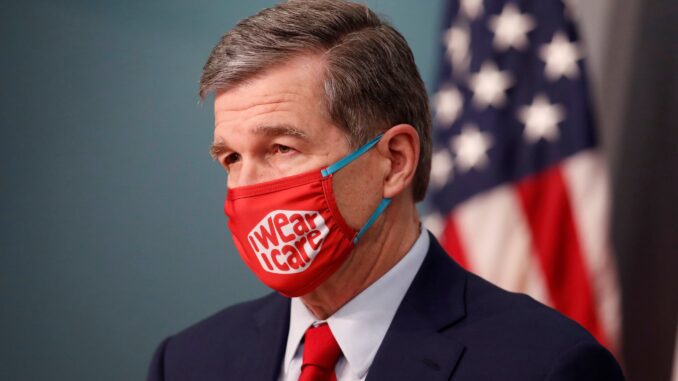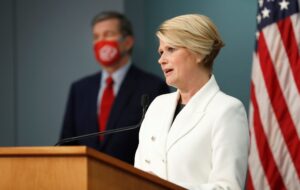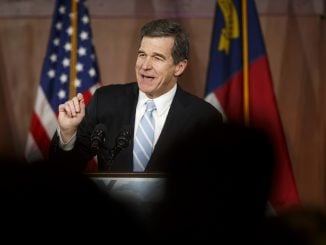
RALEIGH — During a Feb. 2 press conference, North Carolina Gov. Roy Cooper said the state’s schools will return to in-person instruction.
During a Council of State meeting earlier in the day, N.C. superintendent of public instruction Catherine Truitt said that she would join today’s COVID-19 briefing in “an effort to urge our districts across the state to re-open our schools to in-person learning.”

Cooper did not issue a new executive order at the briefing, but instead indicated that the N.C. Department of Health and Human Services’ Strong Schools NC Public Health Toolkit (K-12) will be updated. The updated language says all K-12 schools should “return to in-person five days a week to the fullest extent possible” while adhering to safety protocols such as social distancing. Language in the guidance on masks being required remained unchanged.
When asked why there was no executive order, Cooper said “because districts want to know what the state believes” and that “we are giving them that guidance today.” He said that they will let districts make the decision accordingly.
The N.C. Association of Educators (NCAE) issued a press statement pushing Cooper to place educators at the top of the vaccination list if he intends to reopen schools for in-person learning.
“If Governor Cooper feels so strongly about resuming in-person instruction quickly, then he should support educators and immediately bring the full weight of his office to bear to get all educators vaccinated by the end of this month, just as 25 other states have been able to do,” said NCAE President Tamika Walker Kelly.
Kelly also said local school boards should “continue to make decisions that protect students and educators based on local conditions,” while citing “emerging and increasingly virulent strains of COVID.”
The governor’s actions struck some legislators as belated, as state lawmakers had signaled near the end of January they would take action, and the Senate has already drafted a bill to reopen the state’s school for in-person instruction.
“Gov. Cooper has not acted decisively and the public education bureaucracy has rejected its most fundamental task: educating our children. It’s time for this travesty to end,” Sen. Phil Berger (R-Eden) said in a Jan. 28 press release.
Senate Bill 37, titled, “In-Person Learning Choice for Families,” passed its first reading, and testimony from parents was heard just an hour before Cooper’s announcement. The bill instructs all state school districts to follow the Dec. 4, 2020, version of the Strong Schools NC Public Health Toolkit (K-12) by implementing Plan A (Minimal Social Distancing) and Plan B (Moderate Social Distancing). While the bill specifically instructs districts to offer Plan A and Plan B, it also says a remote option should be available for students who still wish to participate in them.
Senate Bill 37 cites a report by the Centers for Disease Control and Prevention (CDC) on the “dramatic increase in children’s mental health visits to hospital emergency rooms,” including an increase of 24% for children ages 5–11 and 30% for children between the ages of 12–17, when comparing emergency room rates from April to October of 2020 and the same months in 2019.
“Among all the COVID tragedies, the most preventable is the lost learning potential that, for some kids, will last a lifetime. After hearing from so many parents and teachers, we have to act immediately to return children to the classroom to stop further damage,” said Sen. Deanna Ballard (R-Watauga), who sits on the Senate Education/Higher Education Committee and the Senate Appropriations on Education/Higher Education Committee.
Wake County parent Kelly Rogers Mann has led a parent group seeking the return to in-person instruction.
“The bill is so ultra-important,” said Mann, who spoke at Ballard’s committee meeting Feb. 2. Mann said that the bill needs to continue to move forward regardless of what the governor says at his press conference. She also said that the state’s two largest districts, Wake and Mecklenburg, “should be leading the way,” but are currently in Plan C, remote instruction.
Both Berger’s press release and the bill cite the ABC Science Collaborative, and CDC recommendations on COVID protocols would likely be included in any action taken. Most recently, the CDC has released studies showing low-to-no transmission in schools and that they can and should operate using current mitigation options like masks and social distancing.
Earlier this month, a study conducted by Duke University, the ABC Science Collaborative and several other notable organizations showed no child-to-adult transmission and said “within-school infections were extremely rare.” The study looked at 11 North Carolina school districts and nearly 100,000 students and staff that were open for nine weeks of in-person instruction.
Over the summer, Cooper said returning to school full-time was not an option. The governor announced the use of Plan B, the in-person and remote instruction hybrid, but he also said districts could choose Plan C, remote instruction only. With the largest districts opting for remote instruction, the majority of North Carolina’s over 1.5 million K-12 students did not have access to in-person school. Cooper eventually permitted full-time, in-person instruction in mid-September, but only for elementary schools.
According to a Jan. 28 Civitas Institute Poll, 46% of likely registered voters give Cooper a “thumbs-down” on school reopening with only 39% giving him a “thumbs-up.” Disapproval was strongest among Hispanic respondents, with 59% expressing their concern over the governor’s handling of school closures.
Voters were also not happy with their local school district actions, with 45% either strongly or somewhat disapproving and only 34% approving of their district’s actions. The poll also revealed that almost seven in 10 respondents believe student learning has been negatively impacted by instructional changes made in response to the pandemic.




